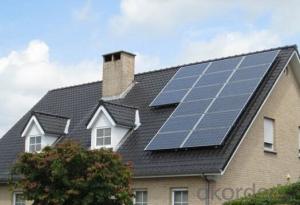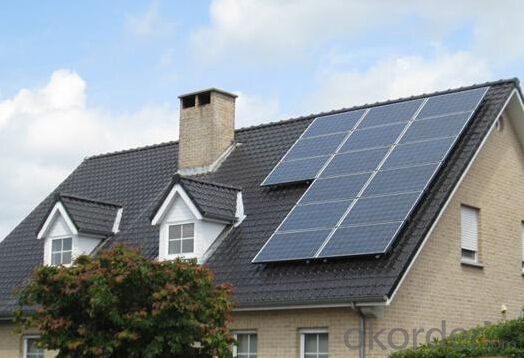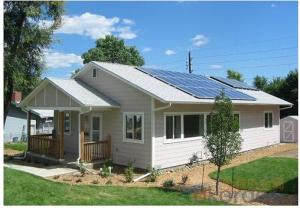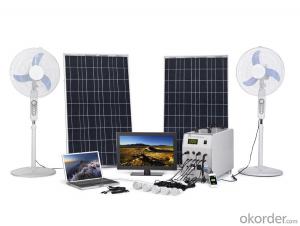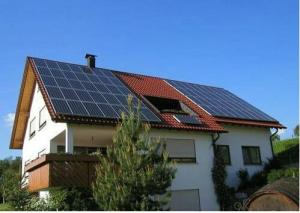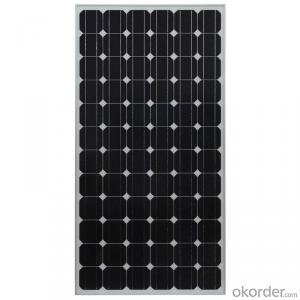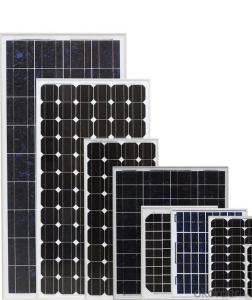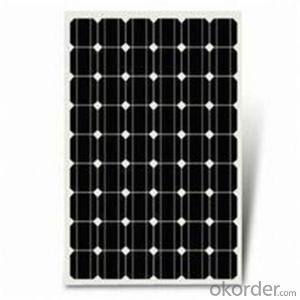Customized Solar Energy Systems - 200W Solar System Made in China
- Loading Port:
- China Main Port
- Payment Terms:
- TT OR LC
- Min Order Qty:
- -
- Supply Capability:
- -
OKorder Service Pledge
Quality Product, Order Online Tracking, Timely Delivery
OKorder Financial Service
Credit Rating, Credit Services, Credit Purchasing
You Might Also Like
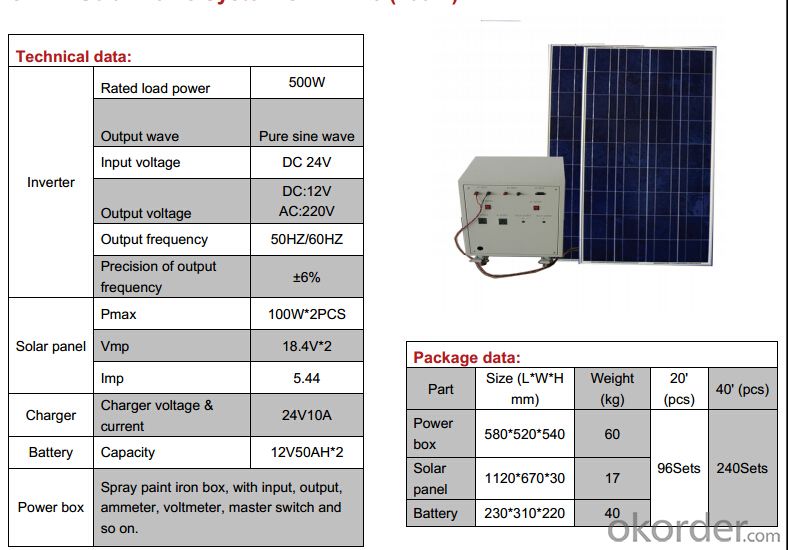
- Q: Can solar energy systems be used in areas with high levels of wildlife activity?
- Yes, solar energy systems can be used in areas with high levels of wildlife activity. While it is true that wildlife can pose some challenges for solar energy systems, there are several ways to mitigate these issues. One of the primary concerns is the risk of damage to the solar panels by large animals or birds. However, there are various protective measures that can be taken to prevent this. For instance, installing fencing or barriers around the solar panels can help keep wildlife away. Additionally, using anti-reflective coatings on the panels can reduce the likelihood of bird collisions. Another concern is the impact of solar energy systems on wildlife habitats. It is crucial to choose the location of the solar panels carefully, considering the existing wildlife activity in the area. By conducting thorough environmental impact assessments and engaging with local wildlife experts, it is possible to minimize any potential negative effects on wildlife habitats. Moreover, solar energy systems can actually benefit wildlife in some cases. For example, solar farms can provide additional shelter and shade for some species, and the open spaces underneath the panels can create new habitats for ground-dwelling animals. Overall, while there may be some challenges, with proper planning and mitigation strategies, solar energy systems can be successfully utilized in areas with high levels of wildlife activity.
- Q: Are solar energy systems suitable for residential properties?
- Yes, solar energy systems are suitable for residential properties. They are a clean and renewable source of energy that can provide electricity for homes. Solar panels can be installed on rooftops or in yards, and they can significantly reduce or even eliminate the need for traditional electricity from the grid. With advancements in technology, solar energy systems have become more efficient and affordable, making them a viable option for homeowners looking to reduce their carbon footprint and save on energy costs.
- Q: Is it possible to store excess solar energy for later use?
- Yes, it is possible to store excess solar energy for later use. This can be done through various methods such as using batteries, pumped hydro storage, or converting the energy into hydrogen or other forms of fuel for later use.
- Q: Can solar energy be used at night?
- No, solar energy cannot be directly used at night as it relies on sunlight to generate electricity. However, with the help of energy storage systems such as batteries, excess solar energy produced during the day can be stored and used during nighttime hours.
- Q: Can solar energy systems be used in areas with frequent power outages?
- Yes, solar energy systems can be used in areas with frequent power outages. Solar panels generate electricity from sunlight, which means they can continue to produce power even when the main grid goes down. Furthermore, by integrating battery storage systems, excess solar energy can be stored and used during periods of low or no sunlight, ensuring a reliable power supply during outages.
- Q: Can solar energy systems be used for powering off-grid telecommunications networks?
- Yes, solar energy systems can be used to power off-grid telecommunications networks. Solar panels can generate electricity from sunlight and store it in batteries, providing a reliable and sustainable power source for remote or isolated locations where traditional power infrastructure is unavailable or unreliable. This makes solar energy an ideal solution for powering off-grid telecommunications networks, ensuring continuous connectivity and communication in remote areas.
- Q: Can solar energy systems be used in areas with frequent snowfall?
- Yes, solar energy systems can still be used in areas with frequent snowfall. While snow can reduce the efficiency of solar panels, it does not render them completely useless. Proper design and maintenance can help ensure that snow is quickly cleared from the panels, allowing them to continue generating electricity. Additionally, advancements in technology and the use of tilt mounting systems can also improve their performance in snowy conditions.
- Q: How does the angle of the sun affect the performance of a solar energy system?
- The angle of the sun plays a crucial role in determining the performance of a solar energy system. Solar panels work by converting sunlight into electricity through the photovoltaic effect. The angle at which the sun's rays hit the solar panels directly impacts the amount of energy they can generate. When the sun is directly overhead, its rays are perpendicular to the surface of the solar panels, maximizing the energy output. This is known as the solar noon or the peak sun hours. As the sun's angle decreases, such as during morning or evening hours, the sunlight has to travel through a larger portion of the Earth's atmosphere, which reduces its intensity. This results in a decrease in energy production. Moreover, the angle of the sun also changes with the seasons. During the summer months, the sun is higher in the sky, allowing for more direct sunlight and increased energy production. In contrast, during winter, the sun is lower, leading to reduced solar energy output. To optimize the performance of a solar energy system, it is crucial to consider the angle at which the solar panels are installed. The tilt angle of the panels can be adjusted based on the latitude of the location to maximize the exposure to sunlight throughout the year. Additionally, tracking systems can be employed to follow the movement of the sun and adjust the angle accordingly, further enhancing energy production. In conclusion, the angle of the sun directly affects the performance of a solar energy system as it determines the intensity of sunlight reaching the solar panels. By ensuring the optimal angle and orientation of the panels, solar energy systems can generate maximum energy output and improve overall efficiency.
- Q: Can solar energy systems be used in powering retirement homes or assisted living facilities?
- Yes, solar energy systems can certainly be used to power retirement homes or assisted living facilities. In fact, solar energy can be a highly beneficial and cost-effective solution for these types of facilities. Retirement homes and assisted living facilities have a high energy demand due to the need for heating, cooling, lighting, and various electrical appliances. By installing solar panels on the rooftops or in suitable areas, these facilities can generate their own electricity and reduce their reliance on the grid. Solar energy systems can help these facilities reduce their operating costs significantly, as they can offset a considerable portion of their electricity bills. This is especially important for retirement homes and assisted living facilities, as they often operate on tight budgets and need to allocate resources efficiently. By harnessing solar power, these facilities can redirect the saved funds towards providing better care and services for their residents. Furthermore, solar energy systems contribute to a cleaner and greener environment. Retirement homes and assisted living facilities have a responsibility towards their residents' well-being, and by using solar power, they can reduce their carbon footprint and promote sustainability. This can have a positive impact on the health and overall quality of life for the residents. Additionally, solar energy systems can provide a reliable source of power during emergencies or power outages. Particularly in areas prone to extreme weather events, where power disruptions are more common, having a solar energy system with battery storage can ensure continuous and uninterrupted power supply to critical areas such as medical equipment, lighting, and HVAC systems. In conclusion, solar energy systems are a viable and beneficial option for powering retirement homes or assisted living facilities. They can significantly reduce operating costs, promote sustainability, and provide a reliable source of power, ultimately improving the quality of care and services provided to residents.
- Q: Are there any financing options available for solar energy systems?
- Yes, there are several financing options available for solar energy systems. These include solar loans, solar leases, power purchase agreements (PPAs), and government incentives such as tax credits and rebates.
Send your message to us
Customized Solar Energy Systems - 200W Solar System Made in China
- Loading Port:
- China Main Port
- Payment Terms:
- TT OR LC
- Min Order Qty:
- -
- Supply Capability:
- -
OKorder Service Pledge
Quality Product, Order Online Tracking, Timely Delivery
OKorder Financial Service
Credit Rating, Credit Services, Credit Purchasing
Similar products
Hot products
Hot Searches
Related keywords
